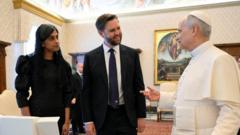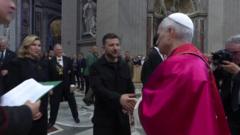Pope Leo XIV's call for a "synodal church" highlights the importance of engaging diverse voices in the church's future decision-making processes.
Voice of Lay Catholics Amplified Under Pope Leo XIV

Voice of Lay Catholics Amplified Under Pope Leo XIV
New pontiff emphasizes inclusivity within the Catholic Church, continuing a legacy of dialogue.
In the autumn of 2024, while still a cardinal, Pope Leo XIV participated in a groundbreaking dialogue within the Vatican that included a variety of perspectives from both clergy and laypeople. The discussions featured representatives from different parts of the globe, including Ethiopia, Mongolia, and Texas, alongside lay participants such as a Catholic podcaster and a business consultant from Australia. Each person had three minutes to speak uninterrupted, promoting an environment where “every voice had equal value,” according to participant Susan Pascoe.
The new pope’s commitment to inclusivity became evident when he took to the balcony of St. Peter's Basilica, stressing the significance of a "synodal church." This concept, which emphasizes ongoing dialogue between church leaders and lay people, aligns with Pope Francis's legacy and reflects a desire for democratic engagement within the church.
Echoing sentiments from a previous era, Pope Leo XIV appears poised to reshape the Catholic Church by encouraging its members—regardless of their clerical status—to voice their opinions and be part of a collective journey. Observers suggest that his leadership style may significantly influence the church's direction, prioritizing a variety of perspectives as integral to its ongoing evolution in the modern world.
The new pope’s commitment to inclusivity became evident when he took to the balcony of St. Peter's Basilica, stressing the significance of a "synodal church." This concept, which emphasizes ongoing dialogue between church leaders and lay people, aligns with Pope Francis's legacy and reflects a desire for democratic engagement within the church.
Echoing sentiments from a previous era, Pope Leo XIV appears poised to reshape the Catholic Church by encouraging its members—regardless of their clerical status—to voice their opinions and be part of a collective journey. Observers suggest that his leadership style may significantly influence the church's direction, prioritizing a variety of perspectives as integral to its ongoing evolution in the modern world.




















